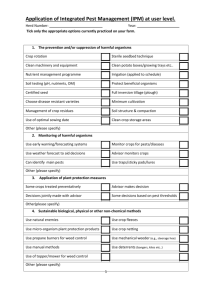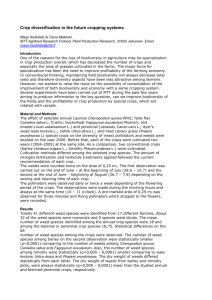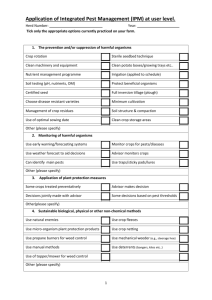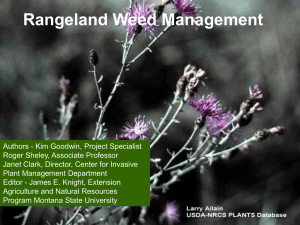Organic - Sustainable Agriculture In Oklahoma
advertisement
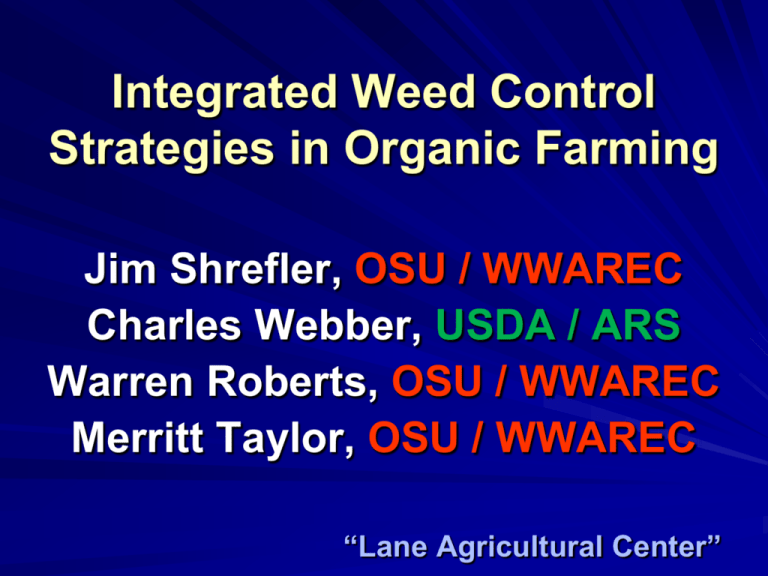
Integrated Weed Control Strategies in Organic Farming Jim Shrefler, OSU / WWAREC Charles Webber, USDA / ARS Warren Roberts, OSU / WWAREC Merritt Taylor, OSU / WWAREC “Lane Agricultural Center” Cooperators / Collaborators OSU Scientists, Specialists USDA Scientists Growers Noble Foundation Kerr Center While On The Soapbox … Why do we want to do this? What are the problems with nonorganic? – Are we irrationally disregarding valuable technology? Will organics be problem free? Can exploration of organics lead to conceptually new ideas? What will the bottom-line be ….. – Should we consider multi-generation sustainability? Weed Control For Organics - Presentation Emphasis Yes - Crops – Fruits – Vegetables – Herbs – Row Crops No - Other Areas – Forages – Turf – Ornamentals What is a Weed? “Plant whose virtues are yet to be discovered” “A plant out of place” Regardless, whether wild or cultivated, extraneous plants in a crop can reduce yield, quality and production cost General Management Factors Exclusion Elimination Prevent Establishment Removal Amelioration General Management Factors - Exclusion Field selection Prevent new weedy species additions General Management Factors - Elimination Prevent weed build-up Destroy propagules – Solarization – Fumigation Eradication – For minor infestations of certain weeds General Management Factors - Prevent Establishment Herbicides Cultivation Cover crops Grazing Mulches – organic and synthetic General Management Factors - Removal Mechanical Chemical Physical – flame – steam General Management Factors - Amelioration Crop Selection – crops that tolerate weeds – crops that enable control of weeds Give crop an edge – transplants – planting date So, what can we do under the constraints of organics? Weed Management for Organics - Exclusion Field selection – a good choice – knowledge needed of sites – usefulness depends on available certified land Prevent weed additions – critical for Organics – “bring-ins” may contain weeds Organic mulches Raw manures Weed Management for Organics - Elimination Prevent weed build-up – timely cultivation, tillage – purposeful plantings – don’t let weeds take over Weed population reduction – perennial management through grazing – fallow / tillage cycles – solarization – fumigants??? Weed Management for Organics - Prevent Establishment Preemergence “herbicides” – corn gluten meal, mustard meal Timely cultivation Stale seedbeds Cover crop management – Species important: e.g. rye – Crop sequence (more detail later) Grazing Mulches – organic and synthetic Weed Management for Organics - Weed Removal – “Stop ‘em in their tracks” Mechanical – cultivation – keep it shallow –minimize injury to the crop –Improve the root zone Manual – choose easy-to-use tools Weed Management for Organics - Weed Removal (cont.)– “Stop ‘em in their tracks” Chemical: vinegar, pelargonate, etc. – currently just contact activity – good foliage cover needed Physical: energy consumers! – flame special equipment, directed flame best for small, annual weeds – steam Weed Management for Organics - Amelioration Crop Selection – use crops that tolerate weeds rapid growth, dense canopy – crops that allow weed control sweet corn – easily cultivated Give crop an edge – plant date – transplants Specific Examples of Tactics Cover crop management Preemergence “herbicide” “Burn down” chemicals Cover Crop Management Cereal Rye a classic example Effective due to – Biochemical constituents – Biomass Management involves – Coordination of rye growth with crop plant date: – Rye destruction: rolling?, tillage? – Crop planting method Preemergence “Herbicides” Bioherbicides Corn Gluten Meal – Makeup: 9% nitrogen (fertilizer?) – Available as powder, granule, pellet Weed control properties – Certain peptides toxic to germinating seeds – Works best under drying soil conditions – Apply to surface or mix very shallowly Burn-down Chemicals Pelargonic acid is a leading option – Also called nonanoic acid & pelargonate – Kills living plant tissue within hours – Contact action not systemic – Ammonium formulation for organic use Control – Grasses: Small & before tillering is best – Broadleafs: varies with species – No crop selectivity
